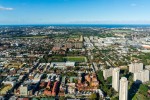EDSA People Power: A Legacy of Freedom and Democracy
The EDSA People Power Revolution stands as one of the most significant events in Philippine history. It was a peaceful uprising that led to the downfall of a dictatorship and the restoration of democracy in the country. Every year on February 25, Filipinos commemorate the anniversary of this historic event, reflecting on its significance and the lessons it imparts to present and future generations.
The Events That Led to EDSA
The road to the 1986 People Power Revolution was paved with decades of political turmoil. The declaration of Martial Law in 1972 by then-President Ferdinand Marcos marked a dark period in Philippine history. Civil liberties were suppressed, political opponents were arrested, and press freedom was curtailed. The assassination of opposition leader Benigno “Ninoy” Aquino Jr. in 1983 fueled widespread dissent and awakened the nation to the urgency of change.
The snap elections in February 1986 between Marcos and Corazon Aquino were marred by allegations of electoral fraud. The blatant irregularities led to nationwide protests, culminating in the call for mass demonstrations along EDSA. The Filipino people, from different walks of life, united in a show of solidarity and resistance, armed only with prayers, flowers, and a burning desire for change.
The Power of a Peaceful Revolution
One of the most remarkable aspects of the EDSA Revolution was its peaceful nature. For four days, from February 22 to 25, millions of Filipinos occupied EDSA, standing in defiance against tanks and soldiers. The military, instead of retaliating, chose to side with the people, further weakening the grip of the dictatorship. The unity and courage displayed during those fateful days demonstrated that real change can be achieved without violence, setting a global example of a successful nonviolent revolution.
The Aftermath and Its Impact
The success of the People Power Revolution led to the exile of Marcos and the rise of Corazon Aquino as the first female president of the Philippines. The event ushered in a new era of democracy, with the drafting of a new constitution that aimed to protect civil liberties and prevent the return of authoritarian rule.
However, despite the victory, challenges remained. The political landscape of the country continued to be plagued with corruption, poverty, and socio-political issues. Nevertheless, EDSA remains a symbol of what Filipinos can accomplish when they stand united for a common cause.
Why EDSA People Power Still Matters Today
As we commemorate the EDSA People Power Anniversary, it is essential to reflect on its relevance in today’s society. In a time when misinformation, historical revisionism, and political divisiveness are rampant, remembering the true essence of EDSA is crucial.
Lessons from EDSA:
-
Democracy is a continuous effort. The fight for freedom does not end with one revolution. It requires constant vigilance, responsible citizenship, and active participation in governance.
-
Unity is powerful. The EDSA Revolution proved that when people come together for a common goal, they can bring about change without resorting to violence.
-
History should not be forgotten. Understanding our past helps us make informed decisions and prevents the repetition of mistakes that led to dictatorship and oppression.
How Filipinos Can Honor the Spirit of EDSA Today
-
Be informed and educate others. Read credible sources about the People Power Revolution and share its significance with the younger generation.
-
Exercise your right to vote. One of the key takeaways from EDSA is the importance of democracy. Participate in elections and choose leaders who uphold the principles of justice and freedom.
-
Promote peace and unity. Differences in political beliefs should not divide us. Engage in constructive conversations and respect opposing views.
-
Hold leaders accountable. Just as Filipinos stood up against tyranny in 1986, citizens today must ensure that government officials remain transparent and serve the people with integrity.
The EDSA People Power Revolution is more than just an annual commemoration—it is a reminder of the Filipinos’ resilience, bravery, and unwavering love for democracy. As we honor this historic moment, let us carry forward its lessons and remain steadfast in safeguarding our nation’s freedom. The spirit of People Power lives on in every Filipino who chooses to stand for truth, justice, and democracy.




